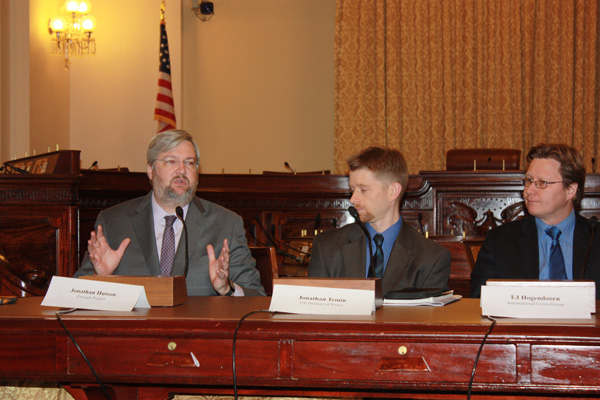
The Sudan Caucus of the U.S. House of Representatives convened for a briefing on the escalating crisis in the Nuba Mountains last week. One of several ongoing conflicts in Sudan, systematic violence in South Kordofan and Blue Nile states targets civilians and is perpetrated by rebels groups and government forces.
The Enough Project’s Jonathan Hutson joined panelists Jonathan Temin of the U.S. Institute of Peace, EJ Hogendoorn of the International Crisis Group, and Lauren Ploch Blanchard of the Congressional Research Service to discuss the ongoing humanitarian crisis and how the international community can work to end the suffering and address underlying causes of violence. The panelists each offered insights into the current conflict, including historical background and recommendations for achieving lasting peace in the region.
The U.N. estimates over 200,000 people have been displaced from South Kordofan and Blue Nile and fled over the borders into South Sudan and Ethiopia. Fighting has trapped many more in the Nuba Mountains without access to humanitarian aid. “The SPLM-N rebels and the government of Sudan are locked in a strategic stalemate and will continue unless something changes from the outside,” said Hogendoorn. Temin emphasized that the Tripartite Process has been unsuccessful in securing humanitarian access to the two states, and the piecemeal solutions of the past are no longer an option in resolving the crisis.
Hutson highlighted the work of Satellite Sentinel Project , or SSP, which analyzes satellite imagery and eyewitness reports from the ground to monitor and report threats to human security in the Sudans. Most recently, SSP has documented evidence of the burning of 26 Nuban villages in a 54 square mile area from November 17-27. This evidence adds to the growing body of documentation of crimes the government of Sudan has perpetrated against its own citizens, including indiscriminate bombings, mass killings, and starvation warfare, which can constitute as crimes against humanity and war crimes. Furthermore, Khartoum’s refusal to allow humanitarian access to South Kordofan and Blue Nile only serves to further compound its crimes.
Although guaranteeing humanitarian access to South Kordofan and Blue Nile is the most pressing matter, Temin emphasized that it must be part of a larger political conversation. There is no quick fix, and any agreement signed now between the SPLM-N and the government of Sudan will not bring lasting peace unless it encompasses the wide-ranging issues that continue to plague the country, connected to the marginalization of areas outside of Khartoum.
The reality, as Temin pointed out, is that the U.S. on its own does not have much influence when it comes to Sudan’s behavior. Sanctions have not had a meaningful effect, and the classic tools of diplomacy no longer apply. The international community must jointly focus on promoting the idea of a comprehensive solution, he said. The African Union will also have to play a critical role in any process. Additionally, the U.S. could be working more closely with Sudan’s allies—especially Egypt, Qatar, and Saudi Arabia—to apply critical diplomatic pressure on the government to end its campaign of violence against civilians, allow humanitarian access to the Nuba region, and begin a peace process with the rebels.
Photo: Enough's Jonathan Hutson presents to the Sudan Caucus, seated next to the U.S. Institute of Peace's Jonathan Temin and ICG's EJ Hogendoorn (Enough / Tracy Fehr)

